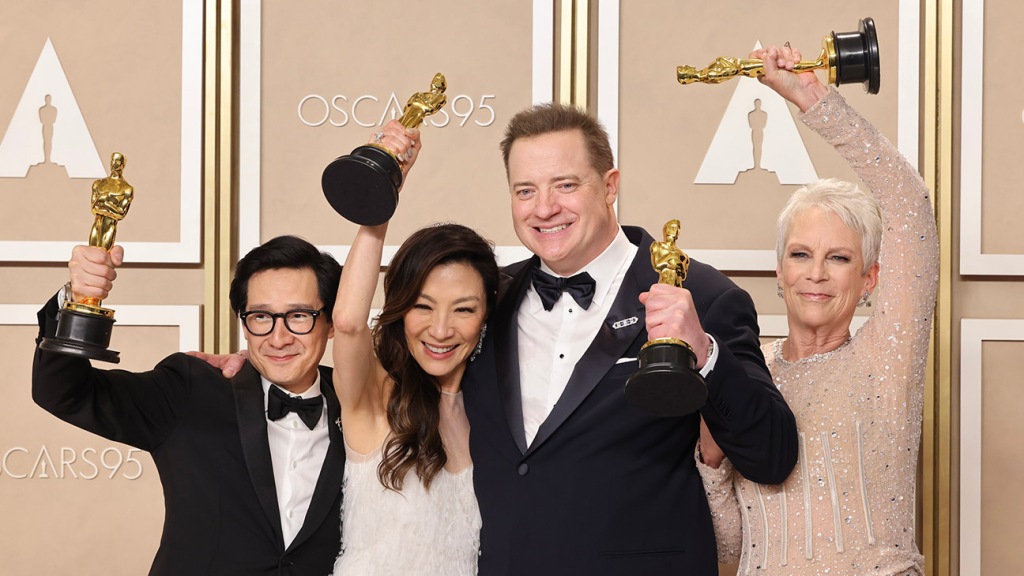
“This time last year, all I was hoping for was just a job.” That’s how Ke Huy Quan opened a tearful acceptance speech at the Gotham Awards in November, when the possibility that the Vietnam-born, Chinese-American actor might be nominated for — and even win — an Oscar for his performance in Everything Everywhere All at Once was starting to crystallize.
Quan would go on to help drive a wildly successful Oscar night for Everything Everywhere All at Once’s indie producer and distributor, A24, which became the first studio in history to sweep the top six awards — picture, director and all four acting prizes — in a single year. The studio’s stunning Oscar haul, which also included Brendan Fraser’s win for The Whale, owes a lot to the appeal of its actors, and to the deft deployment of their charm at screenings, events and on social media.
Winners Michelle Yeoh, Jamie Lee Curtis, Quan and Fraser are all industry veterans who have ridden out career lows. “They focused rightly on the cast,” says a strategist at another studio. “And their actors are so lovable that you wanted good things for them.” Says an executive at another competing studio: “Their comeback narratives – Ke’s particularly — really resonated with voters.”
Some of the events and social media use in support of the film fell into a gray area when it comes to Academy rules, however, prompting some competitors to complain to the Academy. After Oscar nominations are announced, and until the final polls close, film companies are not permitted to invite Academy members to attend any parties or other non-screening events that promote nominated films. A24 itself followed those rules, according to multiple sources connected with the studio, but friends of the actors hosted their own gatherings. Academy members including Jodie Foster, Jake Gyllenhaal and Melanie Griffith threw Jamie Lee Curtis a party in Marina del Rey on Feb. 15, and the Mandarin Oriental Hotel in Beverly Hills hosted a dinner for Michelle Yeoh on Feb. 12 that was attended by Academy members including producers Jerry Bruckheimer and Jon Landau and directors Michael Mann and Oliver Stone. Yeoh also shared — and then deleted — a Vogue story on her Instagram that noted that Cate Blanchett has “already won two Oscars.” The Academy forbids social media that singles out the competition.
Some competitors say that after the Academy declined to take any punitive action against the people behind the unconventional best actress campaign for Andrea Riseborough, the events for Curtis and Yeoh didn’t surprise them. “It’s the Wild Wild West out here now,” says a strategist for another studio. “You can only expect folks to use all avenues that are available to them. If the Academy isn’t willing to set the tone in a way where there are repercussions when those rules aren’t followed, what do you expect?” Says the executive at the competing studio: “I don’t begrudge them pushing the envelope. They won it in the end and that’s all anyone’s gonna remember.” The Academy is expected to review its campaigning rules this summer.
Part of what makes A24’s Oscar wins so remarkable is that they mostly came on the back of a quirky, genre-straddling sci-fi comedy that opened in theaters well outside the traditional awards movie launching window. Everything Everywhere All at Once premiered not at Telluride or Cannes, but at SXSW, which is traditionally better known for its breakfast tacos than for its awards imprimatur. After opening March 25, the film became a box office phenomenon, eventually collecting more than $100 million worldwide.
Much of the A24’s campaigns for both Everything Everywhere All at Once and for Fraser relied on traditional tools, such as cast Q&As with guilds and media coverage. Strategists at Cinetic Marketing and Divergent PR coordinated those efforts, which benefited from a growing and fervent fan base for the film and actors with great chemistry. Some guild audiences would return for multiple viewings and those audiences in turn helped recruit skeptical awards voters. “It was a polarizing film,” says the executive at a competing studio. “But its fans were so passionate that they were converting members who were not into it the first time they tried to watch it. People said, ‘OK, this movie has made $80 million and gotten so many nominations. I know I tried to watch it and didn’t get it, but I’m going to try again.’”
Some competing strategists looked with envy at how well A24’s actors used their own social media accounts, particularly Curtis, who has 5 million followers, and Yeoh, who has 1.8 million. As she did in awards shows and press, Curtis served as an enthusiastic wing woman for Yeoh, which had the effect of reflecting well on her. “Jamie Lee Curtis used social to her advantage in ways a lot of other nominees don’t have the skill or the personality to do,” says one competing strategist. “This season and the results speak in such a big way about how things are changing. Social is just so important, which is what A24 does so well. It’s the best way to reach people now.”













